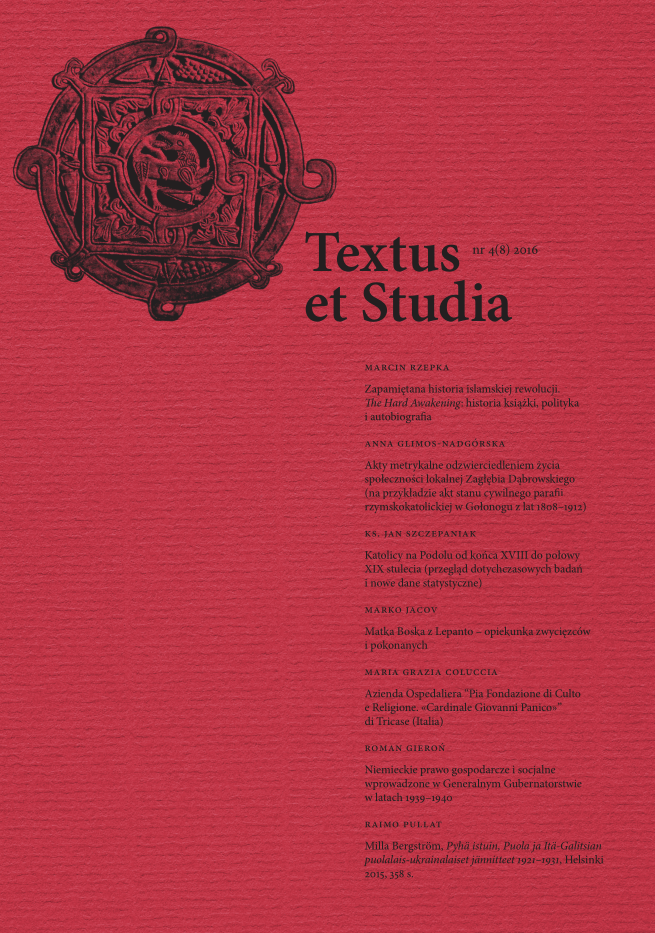Zapamiętana historia islamskiej rewolucji. The Hard Awakening: historia książki, polityka i autobiografia
DOI:
https://doi.org/10.15633/tes.02401Słowa kluczowe:
anglikanie, Iran, rewolucja, Hassan Dehqani-Tafti, książka The Hard AwakeningAbstrakt
The article presenting the situation of the Anglican community in Iran during the Iranian revolution, problems and persecutions the Iranian Anglican faced at that time is focused particularly on a book written by the Anglican bishop Hassan Dehqani-Tafti (1920–2008). The book entitled The Hard Awakening was published in London in 1981 by the Society for Promoting Christian Knowledge, however before its publication the book arose discussions among the workers of the British Foreign and Commonwealth Office. The article attempts to describe and analyze the circumstances in which the book was written and published in a context of hard British-Iranian relations connected to the imprisonment of British citizens in Iran in 1980, underling the importance of the book as a personal story of the revolution seen and experienced by an Iranian, Christian, Anglican.
Bibliografia
Materiały archiwalne
Archiwa arcybiskupa Canterbury, Lambeth Palace Library (LPL), Londyn
LPL. MS 3542.
LPL. MU/OS/5/29/6.
LPL. Fisher 87.
LPL. Runcie/ACP/1981/10.
LPL. Runcie/Main/1981/61.
Archiwa Lutheran Orient Mission, Luther Seminary (LSA), St. Paul, Minnesota, USA
LSA. LOM, Box 6, Correspondence 1978–1979.
The National Archives (TNA), Londyn
TNA. FCO 8/3641 Anglican Church in Iran: detention of British subjects in Iran.
TNA.FCO 8/4067 Anglican Church in Iran.
TNA. FCO 8/4068 Anglican Church in Iran.
TNA. FCO 8/4069 Anglican Church in Iran.
Wspomnienia, autobiografie, listy
Chomejni R.M., Imam Khomeini’s Message to the Noble Christian People of the World on the Occasion of Christmas (23 Dec 1978) [w:] Imam Khomeini, Pope and Christianity, Islamic Propagation Organization, Tehran (2nd ed.) 1984 (1404), s. 7–8.
Czermińska M., O autobiografii i autobiograficzności [w:] Autobiografia, M. Czermińska (red.), Gdańsk 2009, s. 5–17.
Dehqani-Tafti H.B., Design of my World. Pilgrimage to Christianity, Surrey 1982 (pierwsze wydanie: 1959).
Dehqani-Tafti H.B., The Hard Awakening, London 1981.
Dehqani-Tafti H.B., Jek czāh-o do czaszme. Az Taft tā Winczester, Basingstoke 1999.
Dehqani-Tafti H.B., The Unfolding Design of my World. A Pilgrim in Exile, Norwich 2000.
Harney D., The Priest and the King. An Eyewitness Account of the Iranian Revolution, London–New York 1998.
Hunt P., Inside Iran, Tring 1981.
Laingen B., Yellow Ribbon. The Secret Journal of Bruce Laingen, Washington–New York–London 1992.
Parsons A., The Pride and the Fall, Iran 1974–1979, London 1984.
Purjazdān-parast S.M., Ruz-e chodā, Tehrān 1391.
Waite T., Taken on Trust, London 1994.
Opracowania
Ansari A., The Politics of Nationalism in Modern Iran, Cambridge 2012.
Chāmeneji A., Man-o ketāb, Tehrān 1386 (2007).
Dehqani-Tafti H.B., The Episcopal Church in Iran: a Suffering Church, „Anglican and Episcopal History” 1990, 59 (1), s. 10–20.
Dehqani-Tafti H.B., Masih wa masihijat nazd-e Irānijān, vol. III, Basingstoke 1994.
Dehqani-Tafti H.B., The Art of Being a Christian Minority [w:] Hassan Barnaba Dehqani-Tafti 1920–2008, M. Dehqani-Tafti (red.), Basingstoke 2008, s. 120–127.
Dehqani-Tafti H.B., The Plague of Westernization or Scope for Integration? [w:] Hassan Barnaba Dehqani-Tafti 1920–2008, M. Dehqani-Tafti (red.), Basingstoke 2008, s. 128–137.
Kaussler B., British-Iranian Relations, The Satanic Verses and the Fatwa: A Case of Two-Level Game Diplomacy, „The British Journal of Middle Eastern” 2011, 38 (2), s. 203–225.
Kāzemi A., Amr-e ruzmarre dar dżām’e-je pasā-enqelābi, Tehrān 1394 (2016).
Krasnowolska A., Uwagi o języku propagandy Republiki Muzułmańskiej Iranu [w:] Nowo-mowa. Materiały z sesji naukowej poświęconej problemom współczesnego języka polskiego odbytej na Uniwersytecie Jagiellońskim w dniach 16 i 17 stycznia 1981, J. Rokoszowa, W. Twar¬dzik (red.), Londyn 1985, s. 142–151.
Kurzman Ch., The Unthinkable Revolution in Iran, Cambridge, MA–London 2004.
Panahi M.H., An Introduction to the Islamic Revolution of Iran and its Slogans, London 2001.
Pieśni miłosne Hafiza, wyb. i tłum. W. Dulęba, Kraków 1979.
Pipes D., The Rushdie Affair: The Novel, the Ayatollah, and the West, New Brunswick–London 1990.
Rzepka M., Konwersje na chrześcijaństwo w przedrewolucyjnym Iranie, „Studia Religiologica” 2013, 46 (2), s. 79–94.
Rzepka M., Anglikanie w Iranie w czasie rewolucji islamskiej, „Studia Religiologica” 2016, 49 (2), s. 145–159.
Seyed-Gohrab A., Khomeini the Poet Mystic, „Die Welt des Islams” 2011, 51 (3/4), s. 438–458.
Sohrabi N., Books as Revolutionary Objects in Iran, „Age of Revolutions: A HistorioBLOG” 2016, https://ageofrevolutions.com/2016/04/04/ books-as-revolutionary-objects-in-iran/ [dostęp: 20.12.2016].
Sreberny-Mohammadi A., Small Media for a Big Revolution: Iran Interna¬tional, „Journal of Politics, Culture, and Society” 1990, 3 (3), s. 341–371.
Varzi R., Warring Souls. Youth, Media, and Martyrdom in Post-Revo¬lutionary Iran, Durham–London 2005.
Pobrania
Opublikowane
Numer
Dział
Licencja
Prawa autorskie (c) 2018 Marcin Rzepka

Praca jest udostępniana na licencji Creative Commons Attribution-NonCommercial-NoDerivatives 3.0 Unported License.
Autorzy publikujący w czasopiśmie udzielają jego wydawcy zgody o następującej treści:
- Autor zachowuje autorskie prawa majątkowe do utworu, a jednocześnie udziela wydawcy czasopisma zgody na jego pierwszą publikację w wersji drukowanej i wersji online na licencji Creative Commons Uznanie autorstwa 4.0 Międzynarodowe oraz zgody na wykonywanie opracowań, w tym przekładów.
- Autor ma możliwość udzielania zgody niewyłącznej na opublikowanie utworu w wersji, która ukazała się w czasopiśmie (np. zamieszczenia go w repozytorium instytucjonalnym lub opublikowania w książce), wraz z informacją o jego pierwszej publikacji w czasopiśmie.
- Autor może umieścić swój utwór online (np. w repozytorium instytucjonalnym lub na swojej stronie internetowej) jeszcze przed zgłoszeniem utworu do czasopisma.

